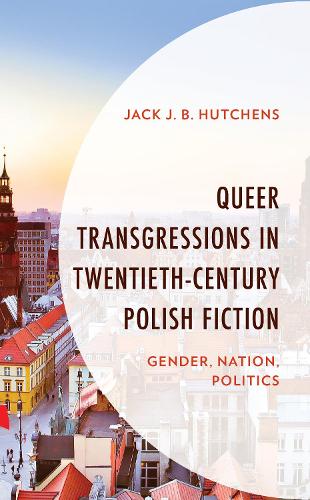
Queer Transgressions in Twentieth-Century Polish Fiction: Gender, Nation, Politics
(Hardback)
Publishing Details
Queer Transgressions in Twentieth-Century Polish Fiction: Gender, Nation, Politics
By (Author) Jack J. B. Hutchens
Bloomsbury Publishing PLC
Lexington Books
22nd July 2020
United States
Classifications
Professional and Scholarly
Non Fiction
European history
891.85380935266
Physical Properties
Hardback
154
Width 161mm, Height 229mm, Spine 18mm
417g
Description
Throughout the twentieth century in Poland various ideologies attempted to keep queer voices silentwhether those ideologies were fascist, communist, Catholic, or neo-liberal. Despite these pressures, there existed a vibrant, transgressive trend within Polish literature that subverted such silencing. This book provides in-depth textual analyses of several of those texts, covering nearly every decade of the last century, and includes authors such as Witold Gombrowicz, Marian Pankowski, and Olga Tokarczuk, winner of the 2018 Nobel Prize in Literature. Jack J. B. Hutchens demonstrates the subversive power of each work, showing that through their transgressions they help to undermine nationalist and homophobic ideologies that are still at play in Poland today. Hutchens argues that the transgressive reading of Polish literature can challenge the many binaries on which conservative, heteronormative ideology depends in order to maintain its cultural hegemony.
Reviews
Hutchens (Loyola Univ. Chicago) offers a close textual analysis of several 20th-century Polish literary works that transgress the traditional nationalist and heteronormative notions of subjectivity. In the first chapter, he compares Jaroslaw Iwaszkiewicz's short story "The Teacher" and Witold Gombrowicz's novel Trans-Atlantyk, using as a theoretical framework the notion of homosexual panic and the erotic-thanatic dichotomy. Hutchens argues that by subverting the traditional heteronormative values, both works reveal the inherent violence of Polish messianic nationalism. He goes on to explore Julian Stryjkowski's reconciliatory approach to his disparate identities ("the Pole, the Jew, the queer"), privileging heterogeneity over the institutionally sanctioned homogeneity. The next chapter focuses on Marian Pankowski's novel Rudolf as a radical political project that through parody, satire, and unapologetic queer erotic undermines the messianic ethos of self-sacrifice and suffering. And the final chapter demonstrates Olga Tokarczuk's use of postmodern feminist and queer aesthetics in destabilizing borders between nations, ethnicities, and genders. This is the debut appearance of some of these works in Anglophone scholarship: either the books have not been translated into English or the authors have not been studied extensively. Summing Up: Recommended. Upper-division undergraduates through faculty.
-- "Choice Reviews"Author Bio
Jack J. B. Hutchens teaches courses on Polish literature and culture in the Department of Modern Languages and Literatures at Loyola University Chicago.
